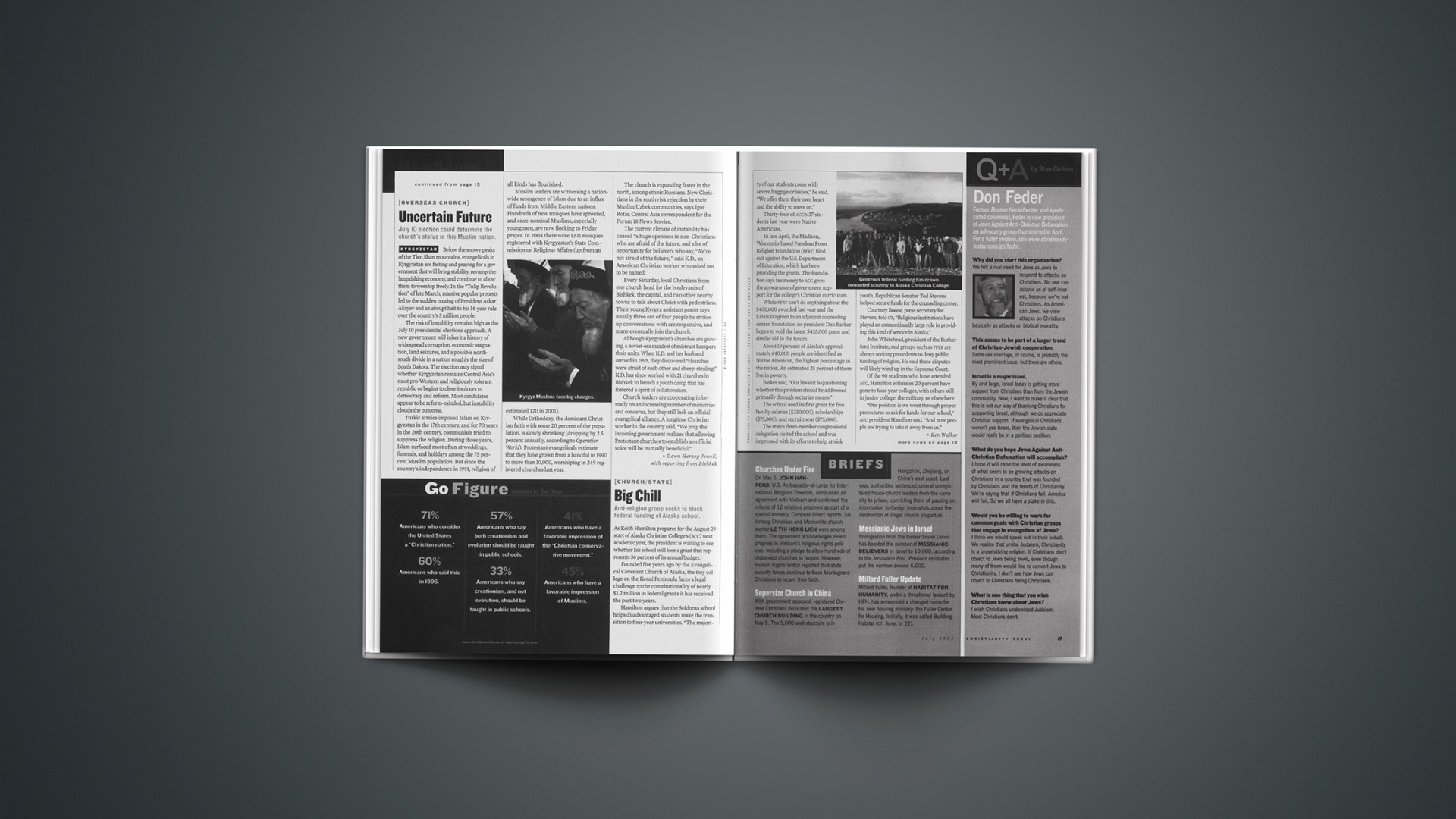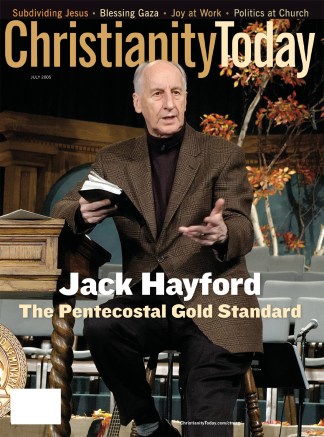Below the snowy peaks of the Tien Shan mountains, evangelicals in Kyrgyzstan are fasting and praying for a government that will bring stability, revamp the languishing economy, and continue to allow them to worship freely. In the “Tulip Revolution” of late March, massive popular protests led to the sudden ousting of President Askar Akayev and an abrupt halt to his 14-year rule over the country’s 5 million people.
The risk of instability remains high as the July 10 presidential elections approach. A new government will inherit a history of widespread corruption, economic stagnation, land seizures, and a possible north-south divide in a nation roughly the size of South Dakota. The election may signal whether Kyrgyzstan remains Central Asia’s most pro-Western and religiously tolerant republic or begins to close its doors to democracy and reform. Most candidates appear to be reform-minded, but instability clouds the outcome.
Turkic armies imposed Islam on Kyrgyzstan in the 17th century, and for 70 years in the 20th century, communism tried to suppress the religion. During those years, Islam surfaced most often at weddings, funerals, and holidays among the 75 percent Muslim population. But since the country’s independence in 1991, religion of all kinds has flourished.
Muslim leaders are witnessing a nationwide resurgence of Islam due to an influx of funds from Middle Eastern nations. Hundreds of new mosques have sprouted, and once-nominal Muslims, especially young men, are now flocking to Friday prayer. In 2004 there were 1,611 mosques registered with Kyrgyzstan’s State Commission on Religious Affairs (up from an estimated 120 in 2001).
While Orthodoxy, the dominant Christian faith with some 20 percent of the population, is slowly shrinking (dropping by 2.5 percent annually, according to Operation World), Protestant evangelicals estimate that they have grown from a handful in 1990 to more than 10,000, worshiping in 249 registered churches last year.
The church is expanding faster in the north, among ethnic Russians. New Christians in the south risk rejection by their Muslim Uzbek communities, says Igor Rotar, Central Asia correspondent for the Forum 18 News Service.
The current climate of instability has caused “a huge openness in non-Christians who are afraid of the future, and a lot of opportunity for believers who say, ‘We’re not afraid of the future,'” said K.D., an American Christian worker who asked not to be named.
Every Saturday, local Christians from one church head for the boulevards of Bishkek, the capital, and two other nearby towns to talk about Christ with pedestrians. Their young Kyrgyz assistant pastor says usually three out of four people he strikes up conversations with are responsive, and many eventually join the church.
Although Kyrgyzstan’s churches are growing, a Soviet-era mindset of mistrust hampers their unity. When K.D. and her husband arrived in 1995, they discovered “churches were afraid of each other and sheep-stealing.” K.D. has since worked with 21 churches in Bishkek to launch a youth camp that has fostered a spirit of collaboration.
Church leaders are cooperating informally on an increasing number of ministries and concerns, but they still lack an official evangelical alliance. A longtime Christian worker in the country said, “We pray the incoming government realizes that allowing Protestant churches to establish an official voice will be mutually beneficial.”
Copyright © 2005 Christianity Today. Click for reprint information.
Related Elsewhere:
The CIA Factbook has basic facts about Kyrgyzstan.
Forum 18 News Service’s Kyrgyzstan report says, “both registered and unregistered religious communities appear to function freely.”
The U.S. State Department’s International Religious Freedom Report on Kyrgyzstan says, “The Constitution and the law provide for freedom of religion, and the Government generally respects this right in practice.”
Earlier CT coverage of Kyrgyzstan and Central Asia include:
Turkmenistan Tightens Religion Law | Violators of new law to be punished by fines or corrective labor. (Jan. 28, 2004)
Catch-240 | Uzbekistan’s repressive regime requires Christians to register, but won’t process their applications. (Dec. 31, 2002)
Crushed by a Soviet Relic | What you can do to help persecuted Christians in Turkmenistan. (Aug. 23, 2002)
Christians Fear Decade of Freedom Is Over | Central Asian countries experienced freedom, growth, repression, and now uncertainty. (Feb. 22, 2002)
Turkmen Authorities Seal Country’s Last Open Baptist Church | Turkmenistan’s secret police continue to raid and harass Christians in Ashgabad. (Feb. 26, 2001)
Tajik Church Ordered to Stop Meeting in Home | Officials order evangelicals to stop meeting, in spite of national law granting right to hold services in private homes. (Nov. 10, 2000)
Christians Arrested After Tajik Church Bombing Freed | Three Islamic students have been detained over bombing of church in Dushanbe. (Oct. 26, 2000)
Tajik Authorities Detain Church Members after Fatal Bombing | Bomb kills 10 Christians and hospitalizes 39 Dushanbe church members. (Oct. 12, 2000)










